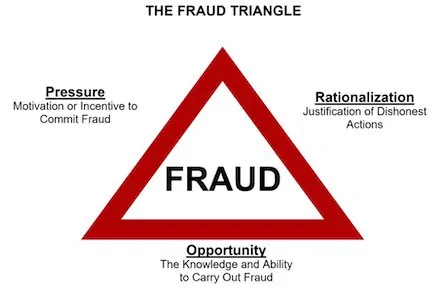
Very early on in my career an associate of mine was fired because he was found to be taking kickbacks from packaging suppliers to whom he had been preferentially and inappropriately been giving business.
Most recently I have received lots of emails and messages from unknown people offering to sell me masks and other personal protective equipment (PPE) for really low prices. A cursory investigation into some of these finds that the items are substandard at best, and the commensurate price gouging during the pandemic reeks of fraudulent behaviour.
One of our most popular articles is Freight Forwarding scams. Every couple of weeks I will get an email from someone, from anywhere in the world, who has been the victim of a freight forwarding scam, and is looking for help.
All of this, and more, has caused to me consider that this is a very important, very real, and very prevalent issue. So let’s discuss Supply Chain scams and fraud.
The Scope
Unfortunately, and disappointingly, you don’t have to look far to find examples of scams or fraudulent behaviour.
TV shows, whether on cable or streamed, are full of stories about scams and fraud. Documentaries, talk shows, shows like “60 Minutes”, “20/20”, or “American Greed”, and of course the news all have tales of people and businesses being scammed.
You experience this behaviour on your phone or in your email. You receive phone calls or texts looking for you to click or to provide your financial information. You get a message saying you either won a lottery or inherited a lot of money. The IRS or some other government agency is after you. You are being sued. Or your identity has been stolen.
All of these are scams designed to separate you from your money. The number of seniors who are scammed is horrendous. According to cnbc.com over 10% of seniors over 65 will be scammed, leaving with them virtually no recourse to recover their life savings.
Businesses are equally subject to scams and fraud, theft and cyber crime. The amount of money that is at play is substantial and obviously attractive to those with nefarious intentions. According to PwC’s Global Economic Crime and Fraud Survey 2020 the total cost of these crimes is $42 billion.
While it is completely foreign to me as to why people would chose this path of crime there is nonetheless a portion of the global population focused on perpetrating these scams and fraudulent behaviour.
What exactly is it that motivates these fraudsters and scammers?
Fraud Triangle
There are many different reasons why people commit fraud or perpetrate scams. The most common conceptualization of these reasons has been captured in the Fraud Triangle theory, created by Donald Cressey.
Source: bestbusinesscircle.com.
The Fraud Triangle depicts not only the reasons why fraud is committed, but by extension what factors must be addressed to prevent fraud. As stated by Wikipedia:
he Fraud Triangle describes three factors that are present in every situation of fraud:
- Motive (or pressure) – the need for committing fraud (need for money, etc.);
- Rationalization – the mindset of the fraudster that justifies them to commit fraud; and
- Opportunity – the situation that enables fraud to occur (often when internal controls are weak or nonexistent).
Vulnerable Areas in Supply Chain
For anyone inspired to act fraudulently in accordance with the Fraud Triangle, Supply Chain holds innumerable opportunities to perpetrate a scam or fraud.
Examples of fraud opportunities at all stages of the Supply Chain are enumerated by esourcingwiki.com.
A partial, but in no way complete, list of areas that could be vulnerable to scams and fraud include:
- The Procurement bidding process and business awards
- Supplier legitimacy
- Supplier selection
- Costing
- Pricing
- False commitments
- Stock rooms, warehouses and any inventory holding points
- High value goods
- High market demand goods
- Trucking, shipping and goods falling off the truck
- Forgery
- Freight forwarding
- Systems access
- Counterfeit goods
- Finance
- Accounts Payable
- Accounts Receivable
- Invoicing and billing
- 3rd parties and middle men
- Contracts
- Conflicts of interest
- Insurance claims
- Cultural/geographic norms of acceptable behaviour
- Inventory records integrity
Preventive and Protective Steps
Someone who is really motivated to commit fraud or a scam will go to tremendous lengths to commit that crime. It is incumbent upon Supply Chain professionals to take proactive steps to mitigate if not eliminate any opportunity for these criminals to succeed in their endeavours.
Some of the steps Supply Chain must take include:
- Perform a robust, honest, and complete risk assessment of all processes, controls and personnel
- Establish auditable, objective and regularly reviewed processes to ensure integrity in all areas of Procurement, Inventory Management, Finance and more
- Perform due diligence in the selection and periodic review of all employees, suppliers, and any other third parties
- Implement advanced physical and systemic security measures and controls
- Provide Control Tower oversight with real time reviews of all processes and metrics
- Enable Cybersecurity steps, firewalls, organization and processes
- Implement a Digital Supply Chain strategy inclusive of digital visibility at all steps of the Supply Chain (eg. automation, bar coding, electronic tracking, Blockchain)
- Implement a process of regular governance of all outsourced service providers
- Exercise regular, real time auditing of all people, processes, controls, vendors and assets
- Create a robust and protected Whistleblower program
- Implement practices to investigate unusual circumstances and behaviour, customer complaints, and financial anomalies in real time
Scams and Fraud in Conclusion
Our list of areas vulnerable to frauds and scams, and our list of steps, are not meant to be exhaustive. But they are meant to promote thinking about the issue and your exposures to those who have ill intentions.
With all of the daily pressures in Supply Chain in can be easy to forget that these vulnerabilities are real, are most likely imminent, and need our attention now to prevent either occurrence or recurrence. Similarly it can be difficult to get resources and the commitment to spend time and money on these initiatives.
Spend the time to focus on putting in the measures to prevent Supply Chain scams and fraud. It happens every minute of every day to someone or to some business. If you don’t implement preventive measures it is only a matter of time until you are the victim of these criminals.
Supply Chain scams and fraud are real and require proactive efforts on your part. Don’t be a victim.


